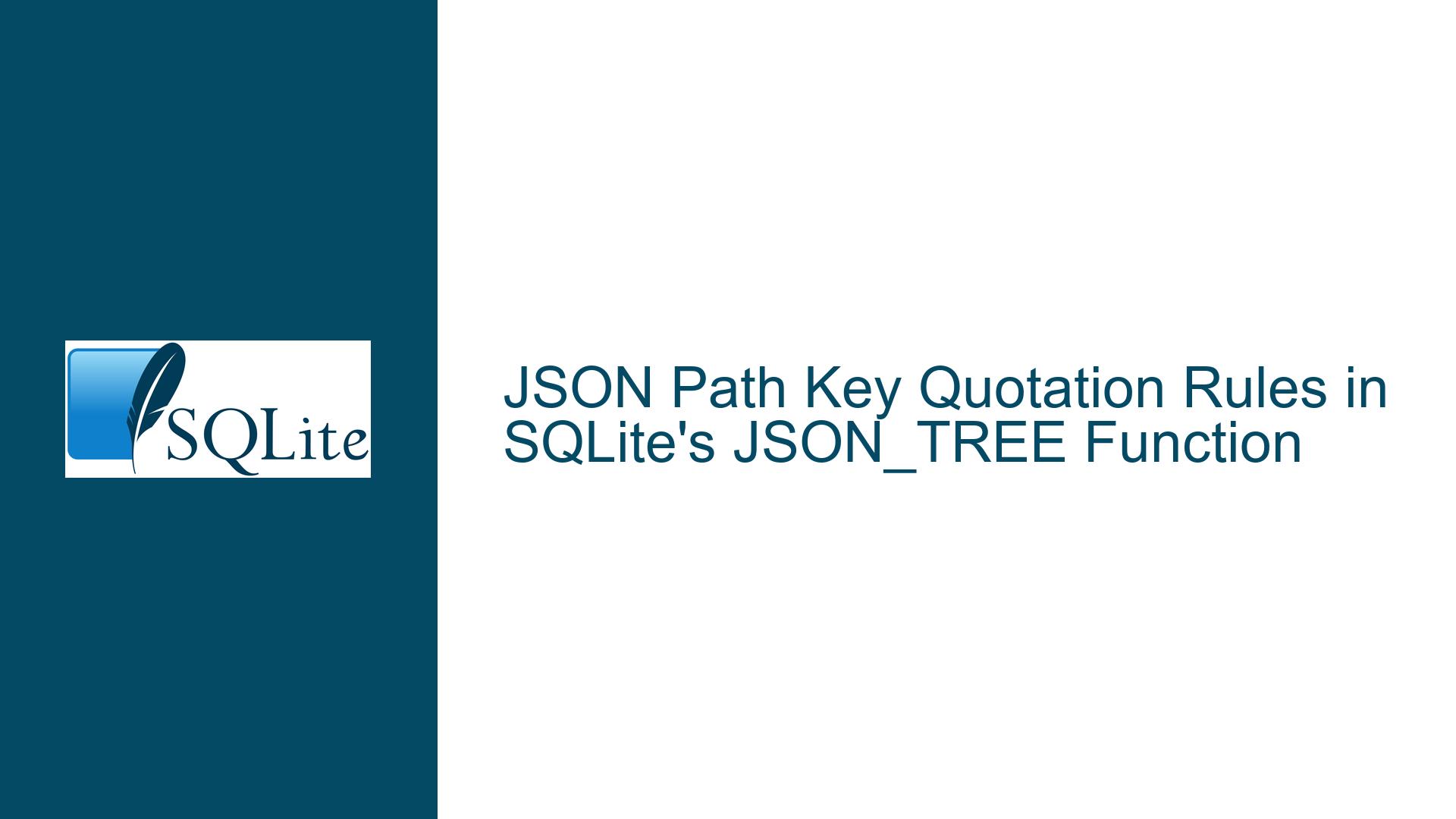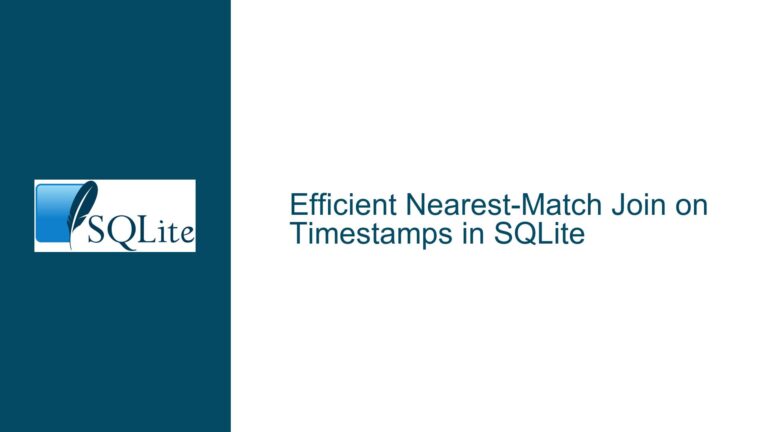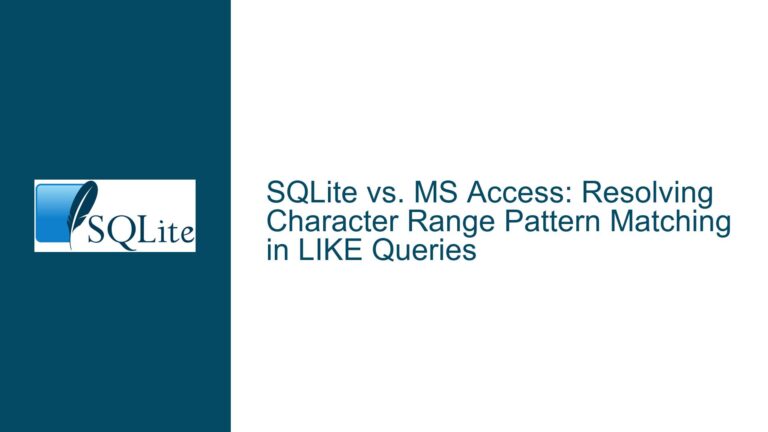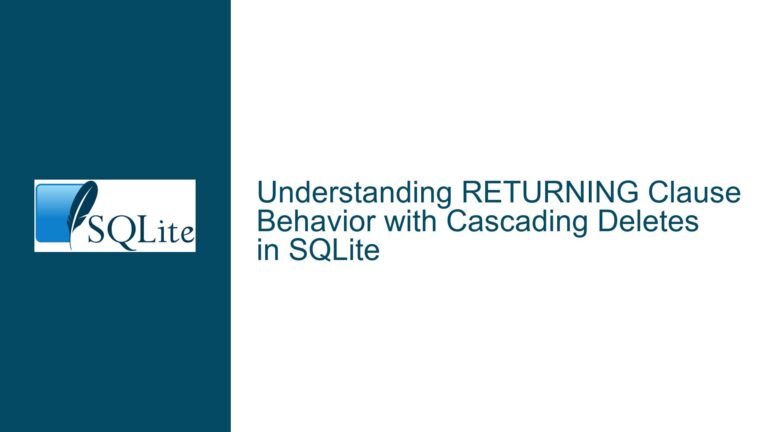JSON Path Key Quotation Rules in SQLite’s JSON_TREE Function
JSON Path Key Quotation Behavior in JSON_TREE
The behavior of JSON path key quotation in SQLite’s JSON_TREE function is a nuanced topic that can lead to confusion, especially when dealing with keys that contain special characters such as underscores. The JSON_TREE function is used to recursively extract JSON data into a tabular format, where each row represents a node in the JSON hierarchy. One of the columns in this output is fullKey, which represents the path to the current node in the JSON structure. The way these paths are constructed, particularly how keys are quoted, is not explicitly defined in the JSON specification, leading to questions about the rules governing this behavior.
In the example provided, the JSON object { "abc": { "def": 1, "_ghi": 2 } } is processed by JSON_TREE, resulting in the following paths:
$(the root)$.abc(the key "abc")$.abc.def(the key "def" under "abc")$.abc."_ghi"(the key "_ghi" under "abc")
Here, the key "_ghi" is quoted in the path, while the other keys (abc and def) are not. This raises the question: Why is "_ghi" quoted, and what are the rules that determine when a key should be quoted in the path?
Possible Causes of JSON Path Key Quotation
The behavior of key quotation in JSON_TREE paths appears to be influenced by the internal implementation of the jsonAppendObjectPathElement function in SQLite. This function is responsible for constructing the path elements in the fullKey column. Based on the observations, it seems that the function applies a heuristic to determine whether a key should be quoted. Specifically, the heuristic may involve checking whether the key conforms to a specific pattern, such as starting with an alphabetical character followed by alphanumeric characters.
Keys that do not conform to this pattern, such as those starting with an underscore (_), a digit, or containing special characters, are likely to be quoted in the path. This is because such keys might be ambiguous or invalid in certain contexts, such as when used in SQL queries or when parsed by other JSON processing tools. By quoting these keys, SQLite ensures that the path remains unambiguous and valid across different contexts.
However, it is important to note that this behavior is not explicitly documented in the SQLite documentation or the JSON specification. As a result, the rules governing key quotation in JSON_TREE paths are subject to change in future releases of SQLite. This lack of formal specification can lead to inconsistencies or unexpected behavior, especially when working with JSON data that contains keys with special characters.
Troubleshooting Steps, Solutions & Fixes for JSON Path Key Quotation
To address the issue of JSON path key quotation in SQLite’s JSON_TREE function, it is important to understand the current behavior and how to work around potential pitfalls. Here are some steps and solutions to consider:
Understanding the Current Behavior: The first step is to understand how
JSON_TREEcurrently handles key quotation. As observed, keys that do not conform to a specific pattern (e.g., starting with an underscore) are quoted in the path. This behavior is likely implemented to ensure that paths remain unambiguous and valid. However, since this behavior is not formally documented, it is subject to change in future releases.Testing with Different Key Patterns: To gain a better understanding of how
JSON_TREEhandles different key patterns, it is useful to test the function with a variety of JSON objects. For example, you can create JSON objects with keys that start with different characters (e.g., letters, digits, underscores) or contain special characters (e.g., hyphens, spaces). By examining the resulting paths, you can identify patterns in how keys are quoted.Handling Quoted Keys in Application Code: When working with the output of
JSON_TREE, it is important to handle quoted keys appropriately in your application code. For example, if you are constructing SQL queries based on thefullKeycolumn, you may need to account for the possibility that some keys are quoted. This can be done by checking whether a key is quoted and adjusting your query logic accordingly.Avoiding Ambiguous Keys: To minimize the risk of encountering issues with key quotation, it is advisable to avoid using keys that are likely to be quoted. For example, you can use keys that start with a letter and contain only alphanumeric characters. This will ensure that the keys are not quoted in the
fullKeycolumn, making it easier to work with the resulting paths.Monitoring Changes in Future Releases: Since the behavior of key quotation in
JSON_TREEpaths is not formally specified, it is important to monitor changes in future releases of SQLite. If the behavior changes, you may need to update your application code to handle the new behavior. Keeping an eye on the SQLite release notes and documentation can help you stay informed about any changes related to JSON processing.Using Alternative JSON Functions: If the behavior of
JSON_TREEis not suitable for your use case, you may consider using alternative JSON functions provided by SQLite. For example, theJSON_EACHfunction can be used to extract key-value pairs from a JSON object, and theJSON_EXTRACTfunction can be used to retrieve specific values from a JSON object. These functions may provide more predictable behavior when working with JSON data that contains keys with special characters.Custom Path Construction: In some cases, you may need to construct custom paths based on the JSON data. This can be done by manually processing the JSON object and constructing the paths according to your specific requirements. For example, you can use the
JSON_EXTRACTfunction to retrieve specific values and then construct the paths using string manipulation functions. This approach gives you full control over how paths are constructed, allowing you to avoid issues with key quotation.Consulting the SQLite Community: If you encounter issues with key quotation in
JSON_TREEpaths, it can be helpful to consult the SQLite community for advice and guidance. The SQLite forum and mailing list are valuable resources where you can ask questions, share your experiences, and learn from others who have faced similar challenges. The community can provide insights and solutions that may not be available in the official documentation.Documenting Your Findings: As you work with
JSON_TREEand other JSON functions in SQLite, it is important to document your findings and share them with your team or the broader community. This can help others who may encounter similar issues and contribute to a better understanding of how SQLite handles JSON data. By sharing your experiences, you can help improve the overall quality of JSON processing in SQLite.Considering Alternative Databases: If the behavior of
JSON_TREEand other JSON functions in SQLite does not meet your needs, you may consider using alternative databases that provide more robust JSON support. For example, PostgreSQL offers advanced JSON processing capabilities, including support for JSONPath expressions and more predictable behavior when working with JSON data. Evaluating alternative databases can help you find a solution that better aligns with your requirements.
In conclusion, the behavior of JSON path key quotation in SQLite’s JSON_TREE function is influenced by internal heuristics that are not formally documented. While this behavior is generally predictable, it can lead to issues when working with JSON data that contains keys with special characters. By understanding the current behavior, testing with different key patterns, and implementing appropriate workarounds, you can effectively manage the challenges associated with key quotation in JSON_TREE paths. Additionally, staying informed about changes in future releases and consulting the SQLite community can help you navigate any issues that arise.






